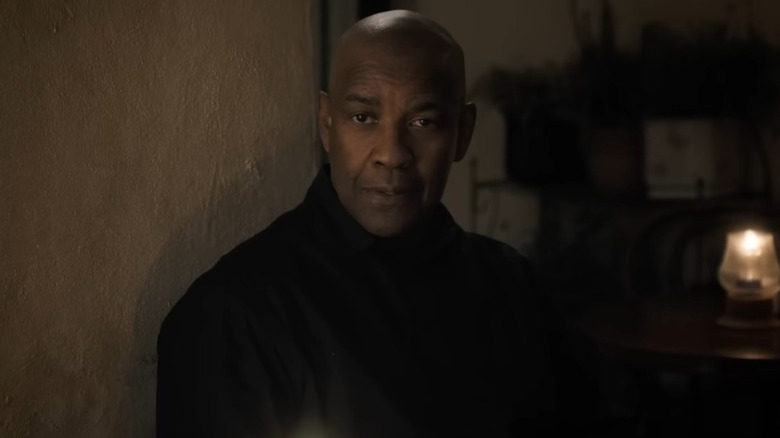The Equalizer 3 Is Antoine Fuqua's Seven Samurai
At first glance, "The Equalizer 3" appears to be a convoluted crime thriller. It certainly races toward that point the further its confounding CIA subplot trudges along.
But once one strips away the, frankly, unnecessary terrorist-drug trafficking scheme and Dakota Fanning's frustratingly tangential character arc, there remains a simple, ageless tale upon which director Antoine Fuqua leaves his own signature: the reluctant warrior who takes on the heavy responsibility of protecting a community, at the risk of becoming part of its fabric for good. Its warm narrative stock is endlessly malleable since its structure was arguably defined by Japanese visionary Akira Kurosawa in his 1954 film "Seven Samurai." In its finest moments, "The Equalizer 3" is triumphantly worthy of this legacy.
Some would argue that Fuqua's 2016 film "The Magnificent Seven" would obviously be the 57-year-old filmmaker's very own "Seven Samurai," as it was a remake of a western of the same name that, itself, was adapted from Kurosawa's samurai epic. However, what Fuqua uniquely grapples with in "The Equalizer 3" (again, ignoring the CIA shenanigans), is how the isolating nature of violence combats the natural human need for community. With "The Equalizer 3," it feels as though Fuqua is finally in conversation with the director whose work impacted him so greatly as a young artist.
Discovering Akira Kurosawa was lifechanging for Fuqua
Like most filmmakers, Antoine Fuqua has a documented reverence for the work of Akira Kurosawa. Growing up poor in Pittsburgh, Pennsylvania, encountering his work for the first time allowed Fuqua to simultaneously escape his own circumstances while gaining further perspective on them. In 2016, ahead of the release of "The Magnificent Seven," he told PhilStar, "When I saw 'Seven Samurai' it kind of blew me away... The movie introduced me to a world that, you know, for me growing up in the ghettos of America, it sort of opened my mind to another world that I wanted to experience."
What really appears to have stuck with Fuqua, however, is the force of Kurosawa's oppressive antagonists, and the courage asked of his heroes to stand up to them. "I think it was because I grew up poor and there's always the influence of bullies," he further explained. "And when I saw the warlords that came in and took the people's rice, it reminded me of a world that I know... Of what that means when people come in and take something that doesn't belong to them. And it just kind of blew me away... It transformed my thinking and it was just amazing."
Echoes of this thinking reverberate loudly in "The Equalizer 3," in which Robert McCall (Denzel Washington) stands up to the Sicilian mobsters plaguing the small Italian town of Altomonte. Like the heroes of "Seven Samurai," McCall's courage inspires those in the town to stand up for themselves as well.

